Local movements have the power to embolden thousands – even millions. Successful ones inspire everyday people to jump into action and demand changes in governance or even a Starbucks cup that is 100% recyclable. But movements no longer have to be organized offline like they were in the 1940s when Saul Alinsky coined the term “community organizing.”
Starting an online petition to rally the citizenry toward one goal is how millions of people around the world are now making a difference in their communities.
Although starting a petition on platforms like Change.org make it easier for citizens everywhere to win victories, local petitions are sometimes more impactful than national ones. Why? To answer that question, we analyzed 300,000 U.S. petitions from Change.org. Our analysis showed us that substance matters. The most successful petitions tell a good story – one that starts with a title.
Local and national petitions
Compared to national petitions, local calls to action tend to be fewer in number. We pulled a sample of 300,000 U.S. petitions from Change.org and found that only 21.8% were local petitions, while 234,735 (78.2%) were national.
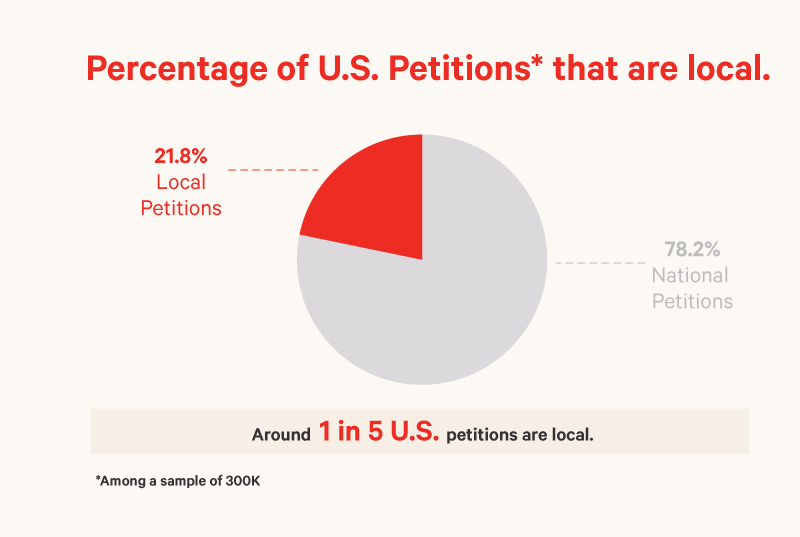
Unlike this petition calling on the U.S. to support Australia’s firefighters, or this one asking Congress to take climate action, local petitions address city or state matters. They may call for the election of a city council member, demand more funding for local school teachers, or request that a governor champion tighter laws around cellphone use while driving. Often, it’s these local matters that help inspire national change.
Fewer signatures required
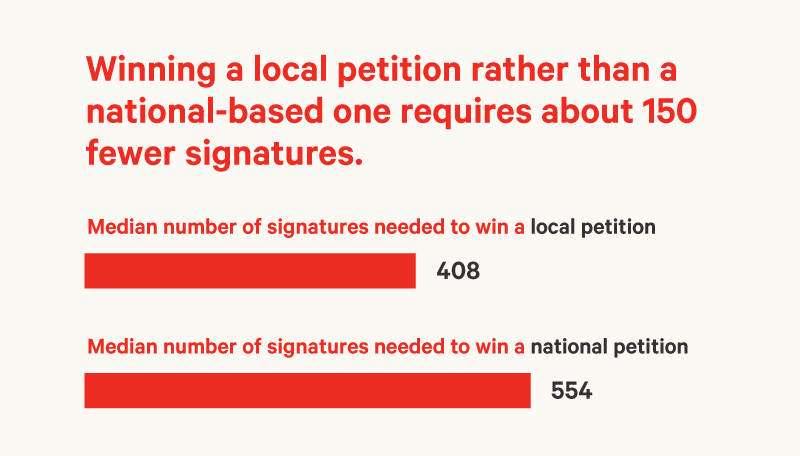
Additionally, we discovered that it takes fewer signatures on locally-oriented petitions for petition starters to achieve a local victory (as declared by the petition starter on Change.org). A national petition needed 554 median signatures to be deemed successful, but a local triumph happened with 408 median signatures. While it’s important to note that a petition victory is user-defined and can take many forms (from simply being acknowledged by the public to actually catalyzing a large-scale policy change), it was still noteworthy to see such a difference between the two classes of petitions. Municipal and state governments are typically representative of a smaller constituency, so it makes sense that local petitions would require fewer people to be invested in an issue.
Petition titles that outperform
Less is more. The Charmin bears and college art professors who teach minimalism share that message. But does less make for more successful local petitions?
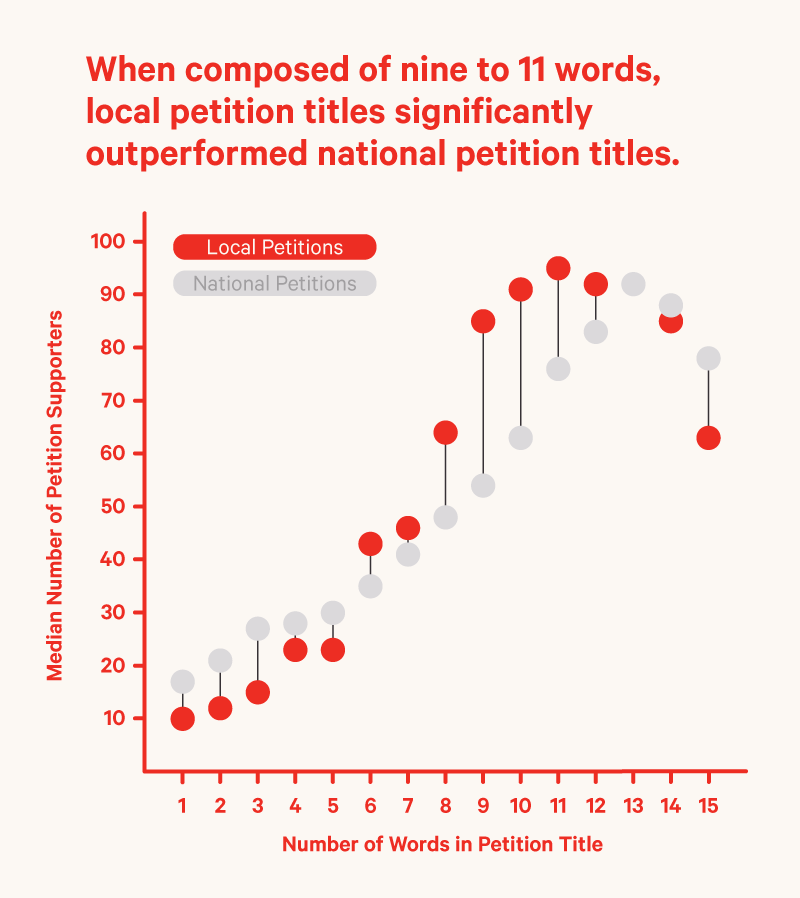
According to the Purdue Online Writing Lab, concise writing is about using “the most effective words” to get your point across – it’s not only about using fewer words. Our analysis shows that local petition titles outperformed national titles significantly when they ran between nine to 11 words. Local petitions did the best – receiving 95 supporters – when their titles ran 11 words long, but national petitions with the same word count only gained 76 signatures.
Do you want to write a successful local petition? Ditch the weak words for ones that effectively communicate your request. Keep in mind that too few words risk making a petition ineffective: When a local petition dipped from nine words to eight, a median of 21 signatures was lost.
Popular petition topics, by state
While we’re aware of how many words render a local petition’s title more effective, what topics are people championing? Let’s take a look at which subjects were the most popular in the sample of local petitions examined.
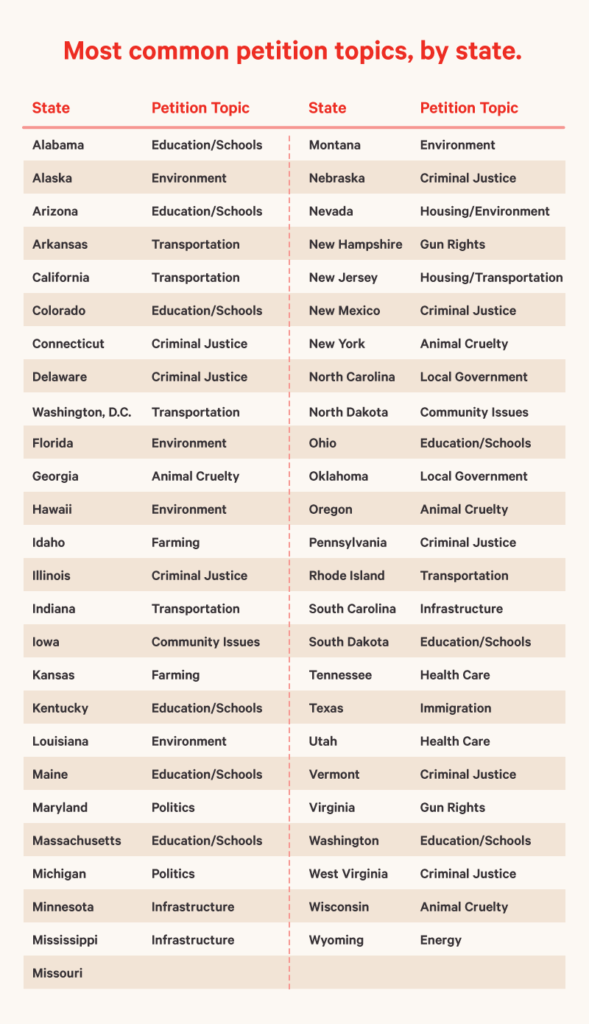
The most popular petition topics in order of frequency:
- Education/schools (9)
- Criminal justice (8)
- Transportation (5)
- Environment (5)
- Animal cruelty (4)
- Farming (3)
- Infrastructure (3)
The least popular petition topics in order of frequency:
- Immigration (1)
- Energy (1)
- Housing/transportation (1)
- Housing/environment (1)
- Health care (2)
- Gun rights (2)
- Politics (2)
- Local government (2)
- Community issues (2)
Petitions intending to make changes to the education or school system were popular in nine states, topping the list of topics, with criminal justice at a close second. The states calling their local community to act on educational matters were: Alabama, Arizona, Colorado, Kentucky, Maine, Massachusetts, Ohio, South Dakota, and Washington.
Although immigration was one of the least popular local petition subjects, only affecting Texas, criminal justice is also a pressing issue in the Lone Star State. “Stop the Execution of Rodney Reed!” has gained more than 646,000 signatures – including support from celebrities like Rihanna, Beyoncé, and Kim Kardashian West – and continues to grow in popularity. In this case, Rodney’s fate is an example of a local movement that has taken off because someone who cares decided to start a petition on Change.org.
Use your words and craft a story
As previously mentioned, the most successful local petitions tell a good story. But what makes a quality story? Is brevity important, or should the story take time to develop?
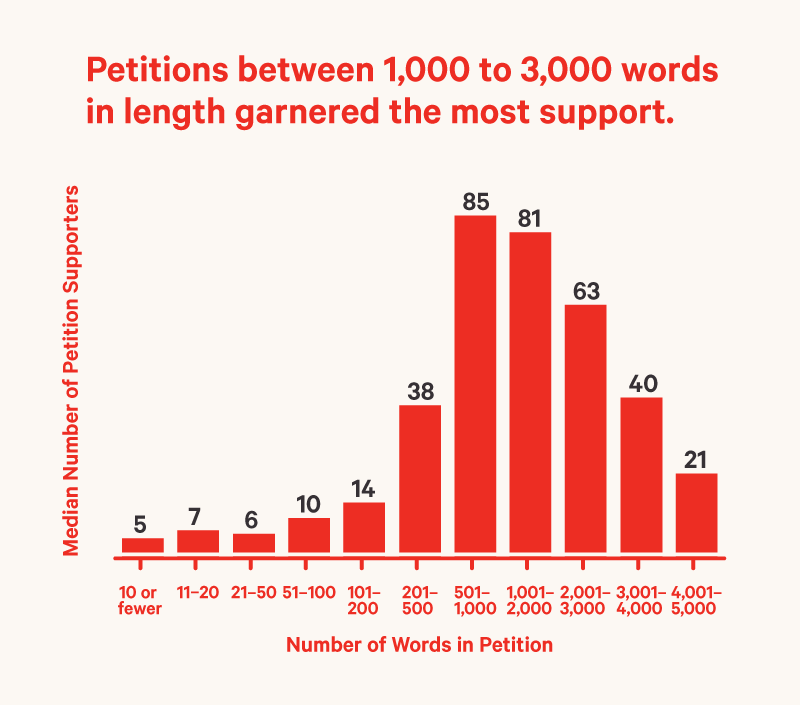
Per the Harvard Business Review, a personal story that unearths dormant memories and is told with conviction is the most effective. The article cites Steve Jobs’ 2005 Stanford University commencement speech as a fine example. Jobs’ address was more than 2,000 words long, lasting nearly 15 minutes. It was deeply personal and inspired the graduating class to take action – to follow their hearts.
The local petitions that drew the most support fell within the same range of words as Jobs’ speech. We found that more signatures were gathered when a petition was between 501 and 3,000 words. However, a request for change that fell between 501 and 1,000 words garnered the most median supporters, overall, pulling in 85 signers. Anything less than 501 words or more than 3,000 lost a significant number of supporters.
Remember, it’s not just about writing a bunch of words – a successful petition tells a compelling story, one that is personal and moves the reader to take a specific action.
The number of paragraphs matters
Think back to your introduction to writing class, when you likely learned that paragraphs are the building blocks of compelling copy. They organize related thoughts in a manner that is both pleasing to read and adds to the overall format.
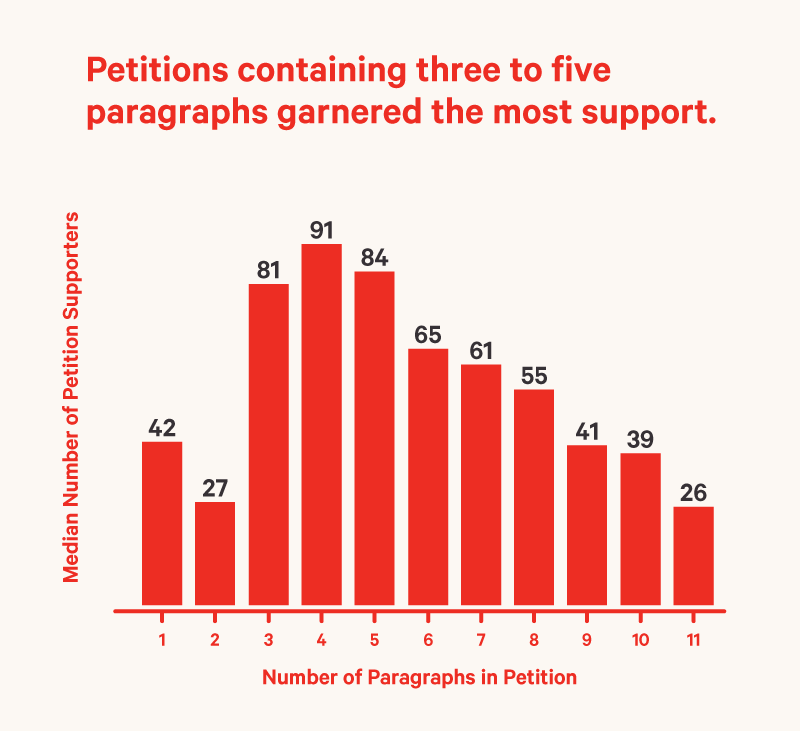
A petition proposes an idea – a different way of doing things because something is awry. As we’ve learned, the most impactful local online petitions tell a story that engages everyday citizens and calls them to act. But they’re also written in several paragraphs.
In addition to cohesively unifying ideas in a petition, having a handful of paragraphs makes the petition more readable. If someone comes across a local petition that contains one clunky block of writing, they will likely turn away, which means you’ll lose supporters.
Local petitions that were four paragraphs long had the most supporters (91 signatures), while one solid block of text only brought in 42 supporters. However, two paragraphs mobilized the least number of people (27 median supporters). Although dividing a petition into four sections seems to be the magic number, anything from three to five paragraphs is likely to pick up more than 80 local supporters.
Action verbs draw readers
While a well-formatted local petition may keep a reader interested, the title draws them in. Not only does the length of the title matter, but so does its use of an action verb – one that conveys a step that should be taken.
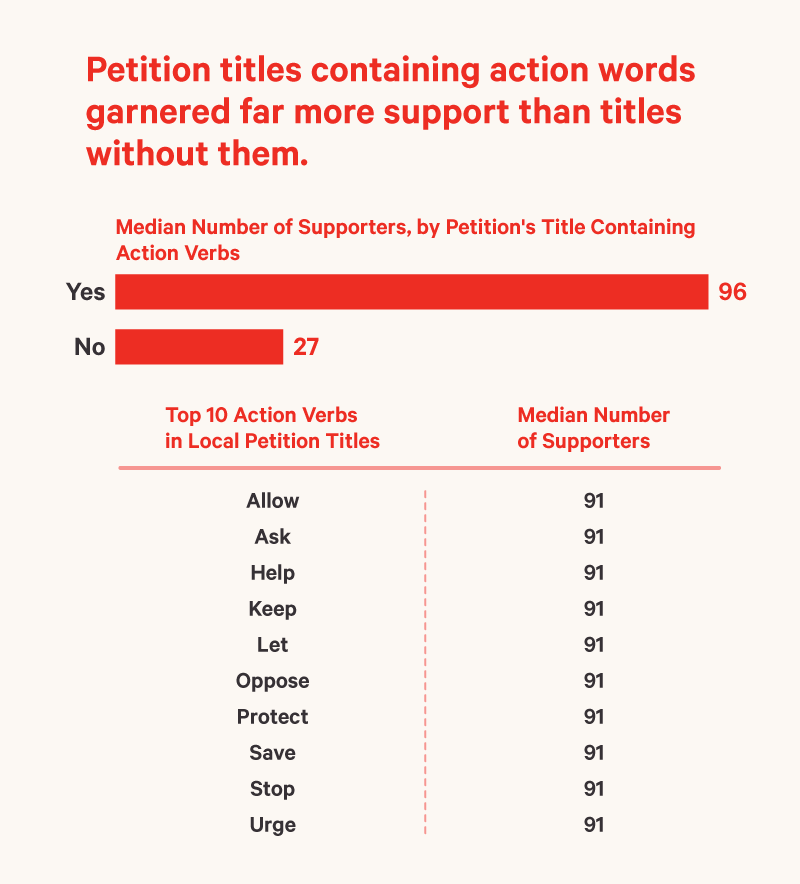
Of the 65,265 local petitions analyzed, the ones that performed best on Change.org included an action verb in the title (96 supporters). Petitions that didn’t include an action verb in the heading achieved 69 fewer median signatures. In the petition to urge Texas Gov. Greg Abbott not to execute Rodney Reed, the action verb “stop” is used. It’s a popular one and made the list of top 10 action verbs found in local petitions that solicited 91 median supporters.
Here are the other nine action verbs that made the list:
- Allow
- Ask
- Help
- Keep
- Let
- Oppose
- Protect
- Save
- Urge
What’s important is that you tell a story
From Aesop to President Barack Obama, history remembers a good storyteller. As J.K. Rowling put it, “There’s always room for a story that can transport people to another place,” and good ones do that. However, a quality story doesn’t have to be told in three parts.
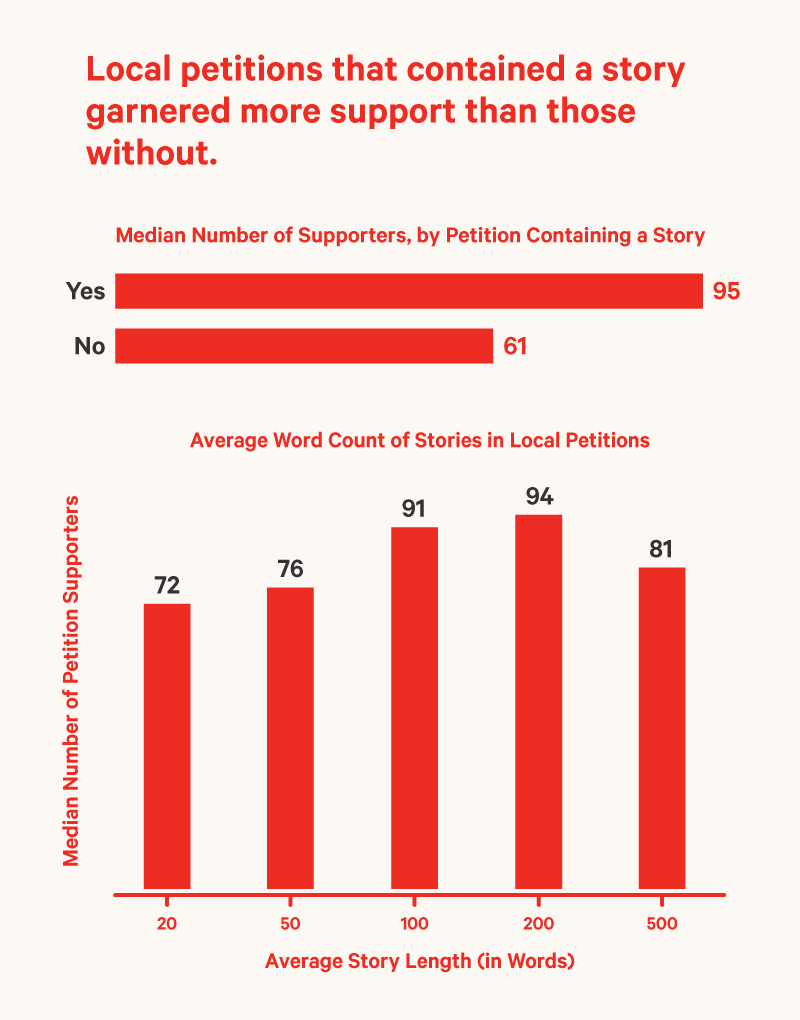
What matters is that the storyteller knows their audience well enough to inspire them to act. When a local petition included a story, it performed significantly well, bringing in 95 median supporters compared to no story, which only brought in 61 median supporters. Word count also matters with story insertion. In analyzing which tales gained the best responses, we discovered petitions that incorporated a 200-word story had 94 median supporters, which was the majority. But it was not an upward trend: 500-word stories didn’t perform the worst, but they only helped local petitions gain 81 signatures.
In the petition “Get Vandegrift a Recycling Program!!” coming out of Austin, Texas, high school student Sammie Sorsby-Jones urged her school administration to install a recycling program at Vandegrift High School. Sammie’s petition succeeded with 330 signatures. Although she laid out her request in three paragraphs, Sammie told a story that anyone in her generation can relate to: The climate is changing, and we will suffer unless you sign this petition to get our school to stop producing 980 pounds of trash per week.
J.K. Rowling’s advice is about painting a picture – bring the reader where you’d like them to go. Sammie did that using statistical information while simultaneously asking others in her generation to visualize a better world.
Petitions work: They spark movements
Local petitions allow thousands – millions, even – to gather their voices to create change. It’s a right given to American citizens in the Bill of Rights, and it’s a right Change.org helps millions of everyday people exercise with a few computer clicks.
Our analysis of 300,000 U.S. petitions proved that not all petitions are made equally. Although more national petitions were started on Change.org, local petitions required fewer signatures to achieve a victory. Petitions started at the city or state level were also more likely to outperform when their titles were medium-length and included an action verb. Additionally, the inclusion of a story within the body paragraphs proved to be beneficial.
No local issue is too small. If there’s something you’d like to see changed in your community, take a stand and start an online petition. You might very well be the one who starts a global movement.
Ready to start a petition on Change.org?
Nick Allardice is the Chief Product Officer at Change.org. Twitter, LinkedIn.
Methodology Notes
All petitions included in this analysis were posted on Change.org between Jan. 1, 2018, and May 31, 2019, and originated from users registered in the United States. This sample represents 65,265 local petitions using local tags, such as city or state names, as well as other phrases or constructs that were highly likely to be associated with a more locally-focused petition. The more advanced story and narrative detection techniques relied on customized implementations of natural language processing algorithms and workflows that had previously been trained on the syntax, grammer, structure, and style of narrative. Based on this training, the algorithms can recognize similar patterns in petition content and identify the petitions with a more developed narrative structure.

